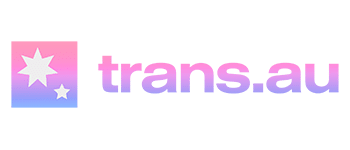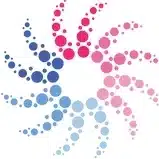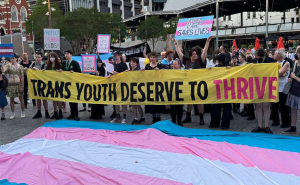This article was originally published by the Trans Health Research team. You can find the original article here.
Author: Dr Sav Zwickl.
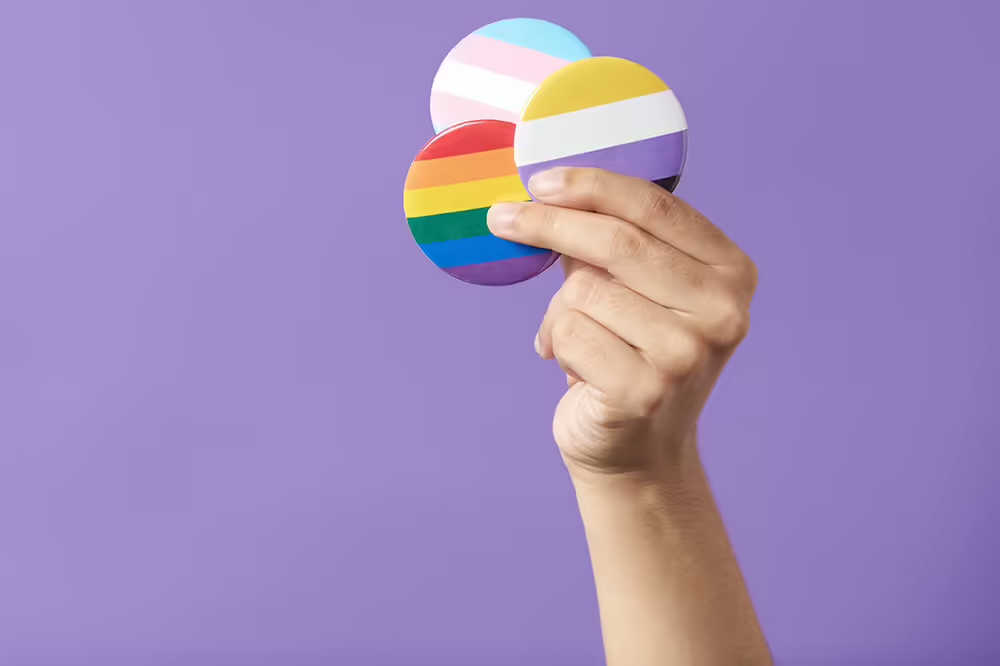
A person holding badges with non-binary, trans, and rainbow flag colours. Credit: Carolina Jaramillo Castro / Alamy Stock Photo
The terminology we use to describe groups of people can have a big impact on who feels represented or included within that group.
When it comes to people who have a gender different to what was presumed or recorded for them at birth, there is no consensus on community-level terminology. The terminology used by governments, community organisations, support groups, researchers, and healthcare professionals varies greatly.
For example, on an international level, the World Professional Association for Transgender Health (WPATH) uses “transgender and gender diverse” in the Standards of Care 8 (SoC8), while the European Professional Association for Transgender Health (EPATH) and the Professional Association for Transgender Health Aotearoa (PATHA) use “transgender”.
Within Australia, the terminology also varies. For example, the Australian Professional Association for Trans Health (AusPATH) uses “trans—binary and non-binary”, the Australian Bureau of Statistics (ABS) uses “trans and gender diverse”, and community organisation Transcend uses “transgender, gender diverse and non-binary”.
It is important that people with lived experience lead conversations about the terminology used to describe their communities. To do this, we surveyed 1023 trans and gender diverse people living in Australia and aged 16+, and asked them ‘what resonates most with you as an inclusive term to describe our entire community (i.e. an umbrella term)?’, and why they chose that term.
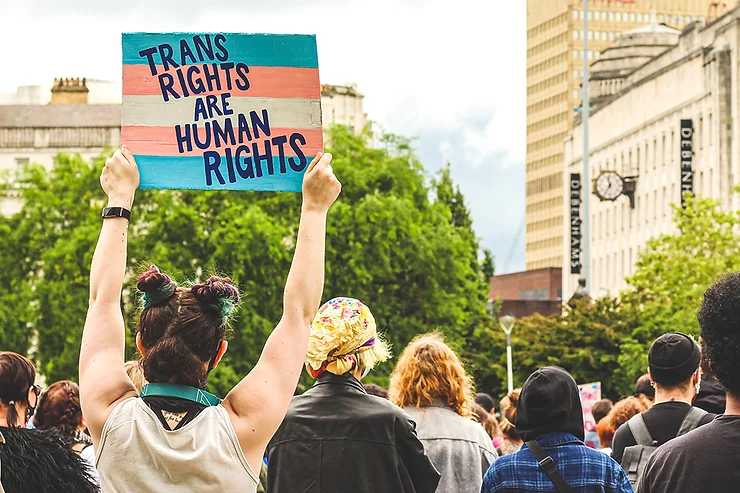
A person holding up a sign which reads, “TRANS RIGHTS ARE HUMAN RIGHTS”. Credit: Oriel Frankie Ashcroft on Unsplash.
No clear consensus on community-level terminology
There was no clear consensus from survey respondents about what community-level terminology was most inclusive. The term “trans/transgender and gender diverse” was the most preferred term (21.9%), followed by “trans/transgender” (19.3%) and “gender diverse” (15.1%).
Terms that are frequently used in research, treatment guidelines, and policy, such as “trans/transgender, gender diverse, and non-binary” and “trans/transgender and non-binary”, were only preferred by 6.7% and 3% of respondents, respectively.
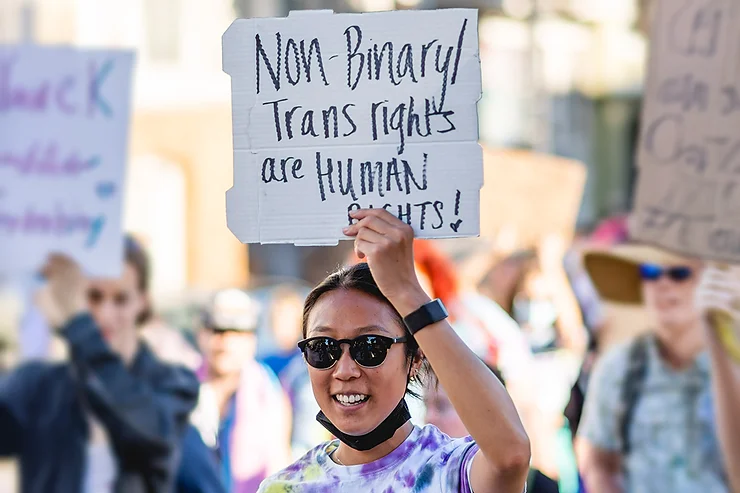
A person holding up a sign which reads, “Non-Binary/Trans rights are HUMAN RIGHTS!” Credit: Patrick Perkins on Unsplash
Why the lack of consensus?
The lack of consensus on community-level terminology is, in large part, due to different and constantly changing understandings of the term “trans/transgender.”
For example, some people understand “trans/transgender” as an umbrella term, encompassing many different gender identities and experiences:
“‘Trans’ is an inclusive umbrella term to describe broadly that your gender doesn’t align with your sex assigned at birth. All trans people, whether they have a binary gender or are non-binary have shared experiences, and uniting under this one term is important for our collective solidarity.”
-Non-binary person, 20’s
Other people, however, referenced the binary and medicalised notions associated with the term “trans/transgender”:
“‘Trans’… can sometimes infer medical transition.”
-Non-binary person, teen.
“If only ‘trans’ or ‘transgender’ is used, it is not always understood to include non-binary.”
-Trans woman, 60’s
These binary and medicalised notions also showed in differences in terminology preference across gender identities and based on history of or interest in medical gender affirmation.
People with a binary gender identity were more likely to prefer the term “trans/transgender”, with 27.9% of trans women and 19.0% of trans men selecting this term, compared to only 8.2% of non-binary people. Inversely, non-binary people were most likely to prefer “trans/transgender and gender diverse” (29.1%), compared to trans men (20.2%) and trans women (18.2%). Three of the four people with a culturally specific gender identity preferred the term “gender diverse”.
People who had a history of or wanted gender-affirming hormone therapy (GAHT) were four times more likely to prefer “trans/transgender” (20.7%), compared to people who did not want GAHT (4.9%). Similarly, people with a history of or desire for gender-affirming surgery (GAS) were also more likely to prefer “trans/transgender,” compared to people who did not want GAS (13.9%). “Trans/transgender and gender diverse” was the most preferred term by people who did not want GAHT (29.3%) or GAS (21.5%).
Many of the people who preferred “trans/transgender and gender diverse” and “gender diverse,” talked about the importance of recognising that some individuals do not identify with the term “trans/transgender” and that “trans/transgender” is a Western term and notion:
“Not all gender diverse people identify as transgender, so [‘trans/transgender and gender diverse’] seems the most inclusive, and ‘gender diverse’ includes identities that expand past the gender binary.”
-Trans woman, 40’s
“‘Gender diverse’ includes cultural identities outside of trans, acknowledges gender diversity as being culturally significant beyond the label of trans – a Western term that functions as a colonial identity.”
-Non-binary person, 20’s
There was also consideration of broader social understandings and accessibility of terminology, and the need for terms that hold positive connotations and are destigmatising:
“[‘Trans/transgender’ is] simple to say and accessible for autistic people and people with learning disabilities, using speech devices, etc.”
-Trans woman, 30’s
“‘Gender diverse’ sounds inclusive and positive – almost as if the world can embrace and celebrate such diversity. I feel like sadly there is a lot of stigma and negative connotations connected with a lot of the other terms.”
-Non-binary person, 20’s
You can read more about the sociocultural factors that underlie these different understandings of terminology in the Discussion section of our publication.
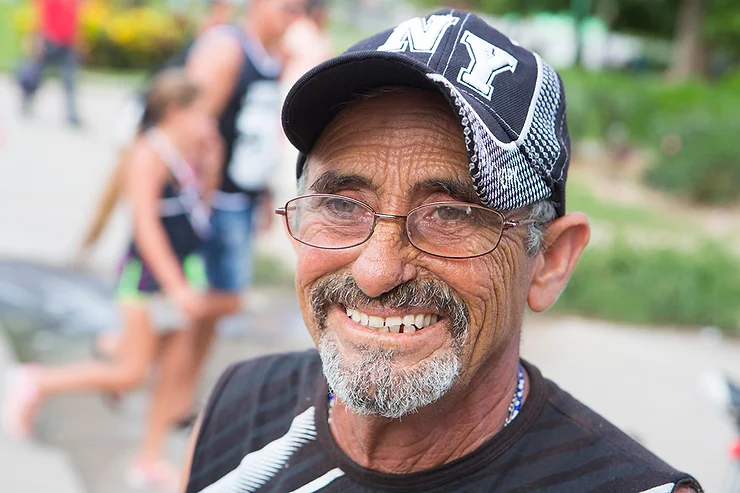
Juani Santos Peréz, who refers to himself as “Cuba’s first transsexual” in the documentary Transit Havana (2016). Credit: Diana Mrazikova / VWPICS / Alamy Stock Photo.
Are “trans” and “transgender” different terms? Is it okay to use acronyms?
Although this study regrettably did not make the distinction between “trans” and “transgender” and it is common to assume that “trans” is just a shortened version of “transgender”, the two can also be considered distinct terms.
Differentiating “trans” from “transgender” is particularly relevant to the inclusion of transsexual people under a community-level umbrella term. While “transsexual” is sometimes referred to as an outdated term (e.g. GLAAD), it is important to recognise that there are some people who are transsexual and not transgender. Therefore, the use of “transgender” in community-level terminology may potentially exclude some transsexual people, whereas “trans” may be a more inclusive umbrella term, encompassing both transgender and transsexual people. As a survey respondent described:
“‘Trans’ [is] a broad umbrella term that can include many kinds of identifications and experiences, including transsexuals.”
-Non-binary person, 30’s
This study also did not explore community perspectives on the use of acronyms and initialisms (e.g. TGD for trans and gender diverse). However, it is widely understood that the use of acronyms and initialisms can diminish the identities and experiences of marginalised peoples.
The International Journal of Transgender Health recommend against the use of TGD or similar acronyms, which is consistent with what we are seeing in other areas of advocacy. For example, the Australian Government Style Guide recommend against using acronyms to reference Aboriginal and Torres Strait Islander peoples, and similar recommendations have been made regarding the term BIPOC for “Black, Indigenous and People of Colour”.
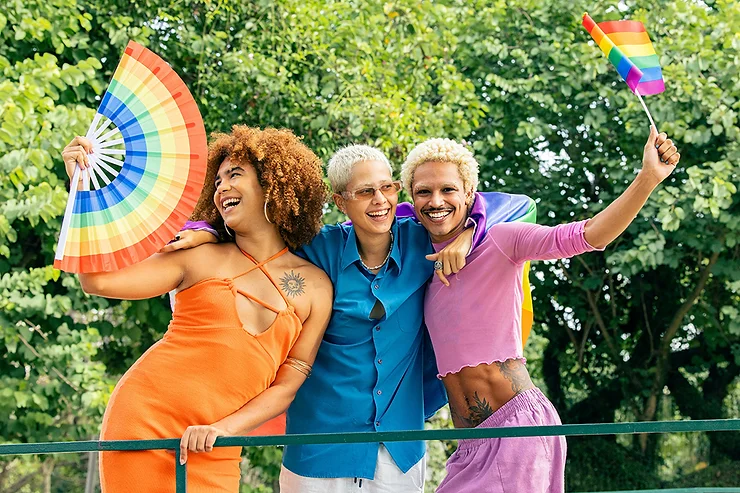
Three diverse friends, of different gender identities and sexualities, waving rainbow flags. Credit: Natalia Blauth on Unsplash.
Terminology Recommendations
Because there is no clear consensus on community-level terminology amongst trans and gender diverse people, there is no perfect or “one size fits all” approach when it comes to what term should be used by government, community organisations, support groups, clinicians, researchers, and community leaders.
While “trans and gender diverse” was considered the most inclusive term by the people we surveyed, it is important to consider perspective that were not represented or that were underrepresented in this study, including Aboriginal and Torres Strait Islander Peoples and people of non-Western cultural backgrounds who may use other terms. Future research should highlight these perspectives.
You can read the full publication in the International Journal of Transgender Health.
Other helpful resources include: Key Definitions, Including Trans People in Research Guidelines, Professional Resources, Community Acronyms, and Community Resources.
